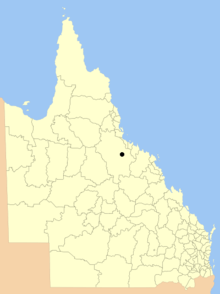Gudjal
The Gudjal, also known as the Kutjala,[1] are an indigenous Australian people of northern Queensland. They are not to be confused with the Kutjal.
 Gudjal traditional lands | |
| Total population | |
|---|---|
| possibly under 100 (less than 1% of the Australian population, less than 1% of the Aboriginal population) | |
| Regions with significant populations | |
(Queensland) | |
| Languages | |
| English, formerly Warrongo language and Gugu Badhun language | |
| Religion | |
| Aboriginal mythology |
Language
The Gudjal spoke a dialect of the Warrongo subgroup of Greater Maric.[2] The materials surviving from earlier periods are not sufficient to reconstruct the language on its own, and arrangements were made, as part of a revitalization programme, to adopt terms and usages still attested for the Gugu-Badhun language.[3]
Country
Gudjal traditional lands encompassed an estimated 7,500 square miles (19,000 km2) on both sides of the Great Dividing Range, taking in At Mount Sturgeon, Mount Emu Plains, the Lolworth and Reedy Springs Stations. It includes the upper Clarke River. The eastern extension ran close to Charters Towers.[1]
History of contact
As colonial settlements began, with their lands been expropriated for cattle runs, the Gudjal were forced southwards towards Hughenden and Pentland.[1]
Art
The Gudjal created rock art galleries, one conspicuous example can be found in the vicinity of Charters Towers.[4]
Alternative names
- Gudjali.
- Koochul-bura.[1]
Some words
- younga. (mother)
- wurboon. (whiteman)
- galbin. (children)[5]
Notes
Citations
- Tindale 1974, p. 178.
- Dixon 2002, p. xxxiii.
- Hobson 2010, p. 96.
- Menghetti 1984, p. 4.
- Lukin 1886, p. 436.
Sources
- Dixon, Robert M. W. (2002). Australian Languages: Their Nature and Development. Volume 1. Cambridge University Press. ISBN 978-0-521-47378-1.CS1 maint: ref=harv (link)
- Hobson, John Robert (2010). Re-awakening Languages: Theory and Practice in the Revitalisation of Australia's Indigenous Languages. Sydney University Press. ISBN 978-1-920-89955-4.CS1 maint: ref=harv (link)
- Lukin, Gresley (1886). "The Clarke River" (PDF). In Curr, Edward Micklethwaite (ed.). The Australian race: its origin, languages, customs, place of landing in Australia and the routes by which it spread itself over the continent. Volume 2. Melbourne: J. Ferres. pp. 436–437.CS1 maint: ref=harv (link)
- Menghetti, Diane (1984). Charters Towers (PDF) (Ph.D. thesis). James Cook University.CS1 maint: ref=harv (link)
- Sutton, Peter (1973). Gugu-Badhun and its neighbours: A Linguistic Salvage Study (PDF) (MA thesis). Macquarie University MA.CS1 maint: ref=harv (link)
- Tindale, Norman Barnett (1974). "Kutjala (QLD)". Aboriginal Tribes of Australia: Their Terrain, Environmental Controls, Distribution, Limits, and Proper Names. Australian National University.CS1 maint: ref=harv (link)